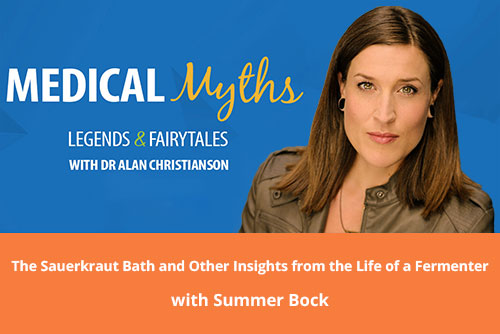Title: The Sauerkraut Bath and Other Insights from the Life of a Fermenter with Summer Bock
Description: Between the latest online fads and the crazy media headlines, it’s easier than ever to get confused about your health. If you want to make better decisions about your health today so you can feel better and live longer, you’ve come to the right place.
On this episode we’re taking a look at your gut and the fermented foods that are claiming to increase your overall health. Fermented foods can be good for your intestines, but some fermented foods are actually harmful to your health in certain situations. Oftentimes the fermented foods that are being sold in grocery stores are not the same foods that are being studied in research, and that can make it very difficult to know which fermented foods you should incorporate into your diet.
I’m joined today by Summer Bock, a microbiologist with a thorough background in the fermented world who trains fermentationists and coined the term ‘gut rebuilding’. We’re going deep into all things fermented, including the time Summer got into a bathtub full of fermented foods. She explains the history of food fermenting, which fermented foods you should avoid at the grocery store, and the value of incorporating fermented foods into your diet for improved overall health. If you have been struggling with your gut health and aren’t sure what to try next, be sure to listen to my conversation about fermented foods with Summer Bock.
Key Takeaways:
[1:10] Today’s topic is fermented foods — which ones are best for your gut health, which ones should you avoid, and how they can help improve your overall health.
[2:18] Introducing Summer Bock, who explains why certain ferments should be avoided depending on your health concerns.
[4:02] Examining the authenticity of one of the hottest fermented food products on the market today — kefir.
[6:53] What is a SCOBY, where did it come from and how does it affect food fermentation?
[10:29] Lactic acid is a healthy natural microbial most commonly found in yogurt.
[12:08] How does leaky gut react to ingesting fermented foods?
[14:58] Summer explains multiple reasons why you will want to avoid kombucha when dealing with digestive issues.
[19:18] GMOs and natural fermented foods — is it possible for a natural food be patented, marketed and sold in grocery stores?
[21:23] Understanding how foods fit together from a historical standpoint and multiple ways that fermented foods interact with your bodily functions.
[23:22] Will you get sick if you try fermenting foods at home? Consider the sugar content, alcoholic content and smell of homemade fermented foods before drinking anything.
[26:58] An overview of Summer’s gut health, chronic illness and functional ferment pairings charts.
[28:12] How to avoid the pitfalls of making your own ferments at home, the value of watching someone else make a ferment in person, and why you should expect to fail at your first attempt.
[30:52] The journey that led Summer to her work with fermented foods started with severe environmental allergies and led her to selling sauerkraut from her home.
[37:44] Summer’s fermenting experiences, from fermenting mushrooms, tempeh, and beans to bathing in sauerkraut brine.
[45:12] Digestive impairment and amino acids — are you protein deficient?
[46:49] Do you have a topic you’d like me to cover? Contact me on Facebook or Instagram using #medicalmyths.
To learn more:
Summer Bock Living Probiotically
Wild Fermentation: The Flavor, Nutrition and Craft of Live-Culture Food by Sandor Katz
Tweetables:
“Fermented foods are never a bad idea, but there are certain ferments you should avoid depending on your health concerns.” — Summer Bock
“What’s logical when it comes to fermented foods? Looking for ancient probiotics and wild probiotics.” — Summer Bock
“When you increase the diversity of your gut microbiome you decrease your risk of developing chronic health conditions.” — Summer Bock
“When people’s digestion is impaired, they’re not getting the amino acids that they need.” — Summer Bock









